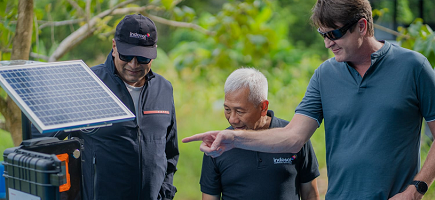
19.12.2023
Necessity is the mother of invention – and of flexibility
After flooding in Ghana, a GIZ project team decided to help – quickly and cooperatively.
The Volta Region in southeastern Ghana was hit by unexpectedly heavy rainfall this summer. Two dams were about to burst. Water released to prevent this happening flooded an area that is home to more than 26,000 people. Many were cut off from electricity, fields and houses were under water and infectious diseases began to spread.
Faced with this situation, Tangmar Marmon and his team decided to help. Marmon is head of a project implemented by the Deutsche Gesellschaft für Internationale Zusammenarbeit (GIZ) GmbH that normally works on expanding the use of renewable energy in Ghana. ‘The extent of the flooding only gradually became apparent, so there were hardly any emergency aid measures in the region to begin with,’ he says. ‘We really wanted to help because the region is one of the poorest in the country.’ The project therefore consulted the commissioning party, the Federal Ministry for Economic Cooperation and Development (BMZ), which agreed to part of the project budget being used for relief supplies.
Emergency aid as a joint effort
The GIZ staff quickly contacted Ghanaian members of parliament and community leaders, who knew exactly what the situation was and what people needed in the districts. The team organised thousands of mattresses, hundreds of beds, wheelbarrows, mobile toilets, dishes, dustbins and watertight boxes.

Almost all of the goods were bought from partners who were already working with the project. ‘We are advising a manufacturer of plastic goods on energy issues, for example, so we bought water tanks from the company,’ says Marmon This meant that the team was able to obtain the supplies quickly and without bureaucracy. What’s more, the partner firms provided all the goods at cost price. They also transported them by lorry at a discount price or even free of charge.
It only took two weeks from the initial idea about providing emergency aid until the first lorries were loaded with supplies. ‘The team worked flat out day and night to ensure that the supplies reached people quickly in the areas affected,’ Tangmar Marmon reports. ‘We have shown that as an organisation, we can respond flexibly to unexpected circumstances and we are grateful for the support we received from BMZ and our political partners. We couldn’t have done this without their support.’



